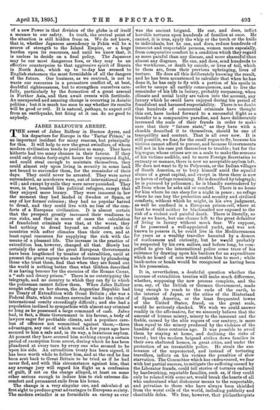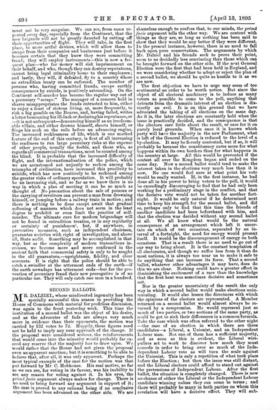JABEZ BALFOUR'S ARREST. T HE arrest of Jabez Balfour in Buenos
Ayres, and his departure for Europe in the ' Tartar Prince,' is an important incident for many reasons, but principally for this. It will help to cow the great swindlers, of whom modern civilisation tends to produce so many. They have hitherto had too many chances in their favour. If they could only obtain forty-eight hours for unpursued flight, and could steal enough to maintain themselves, they could almost rely upon living in security in some land not bound to surrender them, for the remainder of their days. They could never be arrested. They were never surrendered, as murderers were, out of international good- will ; and except by exile they were never punished. They were, in fact, treated like political refugees, except that they enjoyed more luxury. They were innocent in law the moment they had landed in Sweden or Spain, or any of her former colonies ; they had no popular hatred to dread, and they could live with no loss of the com- forts of a European civilisation. It is almost certain that the prospect greatly increased their readiness to run risks, and that in scores of cases the calculation of fraudulent criminals was that, at the worst, they had nothing to dread beyond an enforced exile to countries with softer climates than their own, and at least equal resources for supplying the rich with the means of a pleasant life. The increase in the practice of extradition has, however, changed all that. Slowly but certainly the arms of the great European Governments have been lengthened by treaties of extradition, until at present the great rogues who make fortunes by plundering those who trust them, find that when they are found out the world is nothing better than what Gibbon described it as having become for the enemies of the Roman Caesar, a " safe and dreary prison." There is no outstripping the telegraph, and no country to which they can fly to which the policeman cannot follow them. When Jabez Balfour sought refuge on her shores, the Argentine Republic had no Treaty of Extradition with Great Britain ; she was a Federal State, which renders surrender under the rules of international comity exceedingly difficult ; and she had a population inclined to sympathise with almost any criminal so long as he possessed a large command of cash. Jabez had, in fact, a State Government in his favour, a body of lawyers eager for profitable clients, and a populace care- less of offences not committed against them,—three advantages, any one of which would a few years ago have secured to him a safe and, in its way, a luxurious asylum. At present they have secured him nothing except a certain period of exemption from arrest, during which he has been plundered at every turn by every one who seemed to be upon his side. An extradition treaty has been signed, it has been worth while to follow him, and at the end he has been sent back to Great Britain to be tried as if he had never fled, and with this circumstance against him, that any average jury will regard his flight as a confession of guilt, if not on the charge alleged, at least on some other serious enough to induce him to risk extreme dis- comfort and permanent exile from his home. The change is a very singular one, and calculatcd at first sight to produce great advantages to European society. The modern swindler is as formidable an enemy as ever was the ancient brigand. He car, and does, inflict horrible tortures upon hundreds of families at once. He cannot, it is true, apply the whip or the torch or the knife to individuals, but he can, and does, reduce hundreds of innocent and respectable persons, women more especially, from comparative comfort to a condition which they regard as more painful than any disease, and more shameful than almost any disgrace. He can, and does, send hundreds to the workhouse, or death by suicide, or lives of toil, which to them are, from their previous upbringing, lives of torture. He does all this deliberately knowing the result, and he has been accustomed to calculate that when he has done it, he has only to fly with a portion of his spoils in order to escape all earthly consequences, and to live the remainder of his life in luxury, probably surpassing, when climate and social laxity are taken into the account, any luxury which he ceuld have enjoyed during his period of fraudulent and harassed respectability. There is no doubt that hundreds of commercial criminals have thought this out, have looked forward to a successful flight as a. transfer to a comparative paradise, and have deliberately increased the scale of their frauds in order to make sure that their " future state," as they have with a chuckle described it to themselves, should be one of tranquillity and content. That is all over now. It is still possible, we fear, for the small rogue to fly, because his victims cannot afford to pursue, and because Governments will not in his case put themselves to trouble ; but for the big rogue, whose crimes are on a scale to make the screams of his victims audible, and to move Foreign Secretaries to entreaty or menace, there is now no acceptable asylum left. He does not want to fly to Polynesia, or the Indian villages of South America, or to bury himself amid the squalid slums of a great capital, and except in them there is now no haven of refuge remaining. He is described by telegraph ; he is pursued by policemen ; he is blandly surrendered by all from whom he asks aid or comfort. There is no home for him where he can sleep for a night in peace ; no refuge where he can buy the protection and security and civilised comforts, without which he might, in his own judgment, as well be confined in a European prison-cell, where at least he would neither be blackmailed nor exposed to the risk of a violent and painful death. There is literally, so far as we know, but one chance left to the great defaulter of living in luxury without much fear. We suppose, if he possessed a well-appointed yacht, and was not known to possess it, he could live in the Mediterranean for years as a wealthy traveller haunted by a demon of restlessness and curiosity, but he would probably be suspected by his own sailors, and before long, be com- pelled to give the international police some trace of his existence by drawing upon his bankers for an expenditure which no hoard of coin would enable him to meet ; while bank-notes or bonds would be recognised as having been in his possession.
It is, nevertheless, a doubtful question whether the increase of extradition treaties will make much difference, whether, supposing the new process complete, and the arm, say, of the British or German Government, made long enough to reach to the ends of the earth, to the interior of Japan, or the cities of the Hinterland of Spanish America, or the least frequented towns of the United States, fraud, on the great scale, would be seriously checked. We wish we could answer readily in the affirmative, for we sincerely believe that the amount of human misery, misery to the innocent and the feeble, caused by the able rogues of our century, is more than equal to the misery produced by the violence of the bandits of three centuries ago. It was possible to avoid them by staying at home, and declining the risks of travel ; but the modern brigand strikes down families in their own sheltered homes, in great cities, and under the protection of an irresistible police. He steals the sus- tenance of the unprotected, and instead of torturing travellers, inflicts on his victims the penalties of slow starvation. The Committee which has endeavoured, we fear with but partial success, to mitigate the suffering caused by the Liberator frauds, could tell stories of tortures endured by hardworking, reputable families, such as, if they could only be related with some art, would break the hearts of all who understand what dishonour means to the respectable, and privation to those who have always been shielded from the worst evils of the world, including publicity and charitable doles. We fear, however, that philanthropists must not be very sanguine. We can see, from cases re- ported every day, especially from the Continent, that the new brigands will not be greatly daunted by cutting off their opportunities of flight. They will take, in the first place, to more artful devices, which will allow them to escape from their companies and businesses just before it becomes certain that they knew they were committing fraud; they will employ instruments—this is now a fre- quent plan—who for money will risk imprisonment on their behalf, and who, though they can destroy reputations, cannot bring legal criminality home to their employers ; and lastly, they will, if defeated, fly to a country where no extradition treaty can be enforced. The number of persons who, having committed frauds, escape earthly consequences by suicide, is positively astounding. On the Continent self-murder has become the regular way out of a pecuniary " scrape." The manager of a concern held in shares misappropriates the funds entrusted to him, either to enjoy a feast of riotous living, or, more frequently, to risk a big gamble on the Bourse, and, having failed, writes a letter bemoaning his ill-luck or declaringhis repentance, or —it is not unfrequent—denouncing himself as an irredeem- able villain, and either drowns himself, shoots himself, or flings his neck on the rails before an advancing engine. The increased recklessness of life, which is one marked feature of the end of this century, is first of all increasing the readiness to run large pecuniary risks at the expense of other people, usually the feeble, and those who, as regards all commercial transactions, must be counted among the blind. It is probable that the increased difficulty of flight, and the internationalisation of the police, which we are accustomed not unjustly to reckon among the triumphs of civilisation, have increased this proclivity to suicide, which has now positively to be reckoned among the greater risks of ordinary speculation. It will probably be an increasing risk, and so far as we know there is no way in which a plan of meeting it can be so much as thought of. No precaution about the sale of poisons or the carrying of revolvers can prevent a man from drowning himself, or jumping before a railway train in motion ; and there is nothing to be done except await that gradual softening of manners which does not seem in the least degree to prohibit or even limit the practice of self- murder. The ultimate cure for modern brigandage will not be found in extradition treaties, or in any regularity or certainty of punishment-, but, if anywhere, in preventive measures, such as independent chairmen, guarantee societies with right of investigation, and above all, State audit. Something may be accomplished in that way, but as the complexity of modern transactions in- creases, we become more and more confirmed in the ancient faith that commercial safety is only to be sought in the old guarantees,—uprightness, fidelity, and clear accounts. It is right that the police should be able to catch a swindler at the uttermost ends of the earth—if the earth nowadays has uttermost ends—but for the pre- vention of pecuniary fraud their new prerogative is of no particular use. They will only catch one man in a hundred.



































 Previous page
Previous page